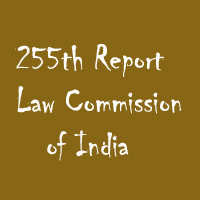Political donations, have long occupied a complicated and murky space in the public domain. The long pending demand for transparency in their collection and disclosure has haunted political parties for a good number of years now. Last year, the Delhi High Court’s judgment against the Bhartiya Janata Party and the Indian National Congress citing their illegally received foreign funding dealt a debilitating blow to claims of transparent and above board campaign funding made by these parties. Moreover, the recent fracas between the Aam Aadmi Party and the AVAM, concerning the receipt of electoral funding from an “unknown foreign source” created a good amount of political debris. The decision of the major political parties to contest the judgment of the CIC allowing RTI application against political parties has only made matters worse. Presently, a Law Commission report to the Central Government on the subject of political donations is in works.
After a considerable amount of consultations as well as deliberations with the stake holders, the honourable panel is in the final stages of submitting the 255th report to the Union Law Ministry on March 11, highlighting the electoral reforms needed to be instituted with respect to political donations. The Law Commission has drafted the report which consider the question of amending the regulatory provisions relating to such donations and the mechanisms which are needed to be put in place in order to ensure precision and transparency in the process of giving and receiving donations.
In the events preceding the Delhi Assembly elections, the AamAadmi Volunteer Manch had alleged that AAP had received funds from dubious companies from Canada and other foreign destinations. The amount received was alleged to be nearly 2 crores, which was purported to be black money received from different companies operating abroad. However, the party was given a clean chit after the donors were reported to be genuine and the funding found to be legitimate.
Earlier last year, the Delhi High Court had held the BJP and Congress guilty of receiving illegitimate foreign funding in contravention of the Foreign Contribution (Regulation) Act. Though these major parties have appealed the decision in the Supreme Court, the matter is far from being resolved and has caused a lot of disrepute to both the parties.
The Law Commission had, in 2014, proposed that Parliamentarians and Assembly members should be disqualified if a chargesheet is drafted against them for the offences which carry a sentence of five years or above (criminal case). However, the proposal has not found many takers within the Supreme Court or the political establishment.
Further, the law commission is also set to make recommendations with respect to electoral issues like opinion/exit polls showcased vociferously by the media which may be capable of influencing the public as well instances/patterns of paid news proliferating on a daily basis.
One of the primary focus of the work undertaken by the Law Commission is the mechanisms that need to be developed within the boundary of the constitutional guarantee of free speech in order to curb the menace of biased or favourable news items being reported or telecasted by the print or news media, in order to cater to vested interests in the political firmament as well as to influence the free and fair electoral process in the country.
The panel is also touted to debate the need to provide state funding of elections for a candidate and if it is permitted, then what should be the applicable criterion or quantum of funds to be devolved per candidate. Further, the publication of government advertisements, highlighting the achievements of a political party in power for a period of 6 months preceding the date of dissolution of the House, can also be restricted as per the recommendations of the law commission.
Furthermore, the Law commission will consider questions such as the maximum limit of campaign expenditure in light of the increase in the cost/price index, furnishing of inaccurate or false particulars as a ground of candidate’s disqualification, and limiting a candidate’s privilege to contest on more than one seat at a time.
by Siddhartha Singh.

